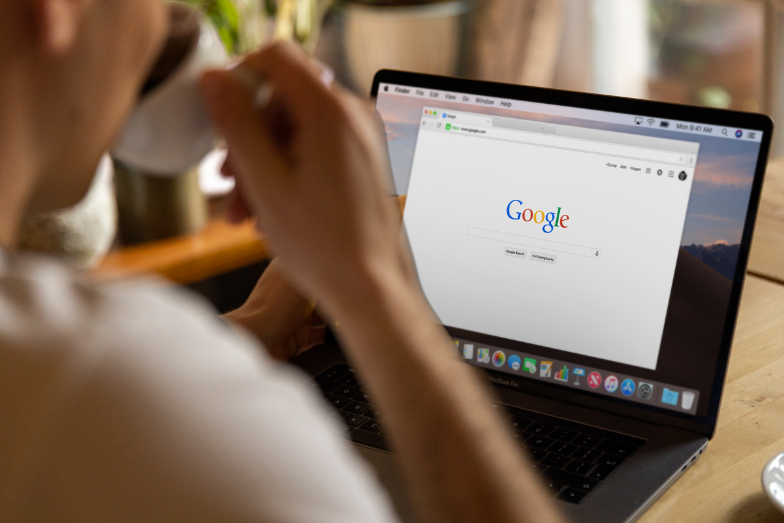
October 24, 2023
The loaded question recently took center stage for the largest big-tech trial in twenty-five years. Whether you’re an internet guru or an analog holdout, you’ve likely asked Google a query or two at some point in your life. This new chapter in digital history sets the stage for the future of online access with the way we reach information now dependent on laws written far earlier than our ability to Google them.
Google arrived in court Tuesday, September 12th, three years after the Department of Justice originally sued the media tyrant for violating anti-trust law. It’s important to note that although Google currently faces several lawsuits, this particular case was brought against Google’s Search arm. As it stands, Google enjoys a 90% market share of all internet searches, as well as the endless monetizing benefits that come with it. So how did such a command come to be? The DOJ, along with thirty-five states, claim foul play.
The Secret to Search Success
Google claims its dominance as a perk of their product, with users naturally flocking to the best available search engine on the marketplace. However, the DOJ disagrees, calling Google’s business practices into question. Google spends billions on agreements with browser developers, device manufacturers, and phone carriers to be installed as their default search engine. Some notable examples include Verizon, Mozilla, and Apple, with Apple alone estimated to accept around twenty billion dollars from Google from their deal.
Now for the murky part. Shipping as the default search engine is not a permanent fixture since these settings can be changed at any time. However, it’s been shown that most consumers don’t know, nor care to dig through often out-of-the-way menus to make a change. Although there’s nothing inherently wrong with having a bidding market for this sticky, search engine placement, the DOJ claims few companies have the financial means to contest Google. Another way of looking at this is to say Google is leveraging unmatchable sums of money to monopolize the default space.
What We Learned from Microsoft
Microsoft for example, with their Bing engine, only holds 6.4% of all searches at current. Ironically, the last comparable trial was against Microsoft in 1998. At the time, the DOJ challenged Microsoft’s Internet Explorer and their 95% market share of searches in the early 2000s. Armed with a similar defense based on the idea of having a superior product, Microsoft fought claims pertaining to their practice of forcing Internet Explorer to be installed along with their extremely popular Office Suite applications.
Although Internet Explorer remained in Microsoft's ownership, the billions in fines from their lawsuit disrupted the suppressive blanket slowing other search engines from arriving on the scene; Google was one such product to emerge in their wake. In any market of giants, small companies tend to struggle for footing regardless of what advancements they may offer. These environments, where massive companies become accustomed to little or no competition, are thought to pose a consumer threat. Without pressure to adapt, innovate, and improve, the quality of products available may stall or diminish. These market-centric principles are the DNA of anti-trust and bring our laws into the trial spotlight.
The Rules of Anti-Trust Law
Our current anti-trust laws, the Sherman Act of 1890 and both the Federal Trade Commission and Clayton Acts of 1914, were all drafted decades before the internet. Although each law was intentionally written in general terms to keep power in the hands of court interpretation, United States vs. Google is a critical test of their integrity. At their core, anti-trust laws ensure businesses remain in competition with one another for the consumer’s benefit. The DOJ will be evaluating Google’s strategies against such tenants of keeping prices low and quality high.
What does all this mean? There are really two major stakes at play. United States vs. Google will test the effectiveness of our anti-trust law against big tech. Beyond that, it will set the precedent for similar cases that wait in cue including Meta’s acquisition of Instagram and Amazon’s Prime Service. If the DOJ loses, our laws may need updating to address our new world of technology. If Google loses, it could open the door for the rapid emergence of new digital services. Either way, the effect will be felt by all who use the internet, and that includes you.
For Now, We Have to Wait
Over the last 25 years, Google has become a 1.7 trillion-dollar company that owns major swaths of our online experience. Search ads accounted for nearly 60% of the company’s revenue in 2022 at 162.45 billion. This does not include any way Google monetizes information captured from their 90% market share of search. Closing arguments, as well as any decisions of United States vs. Google, are likely to continue far into 2024. Beyond that, a separate penalty trial could be delayed over years to come.
Ref/Research
https://www.linkedin.com/news/story/united-states-v-google-begins-5759684/
https://www.vox.com/technology/2023/9/11/23864514/google-search-antitrust-trial
https://www.ftc.gov/advice-guidance/competition-guidance/guide-antitrust-laws/antitrust-laws






